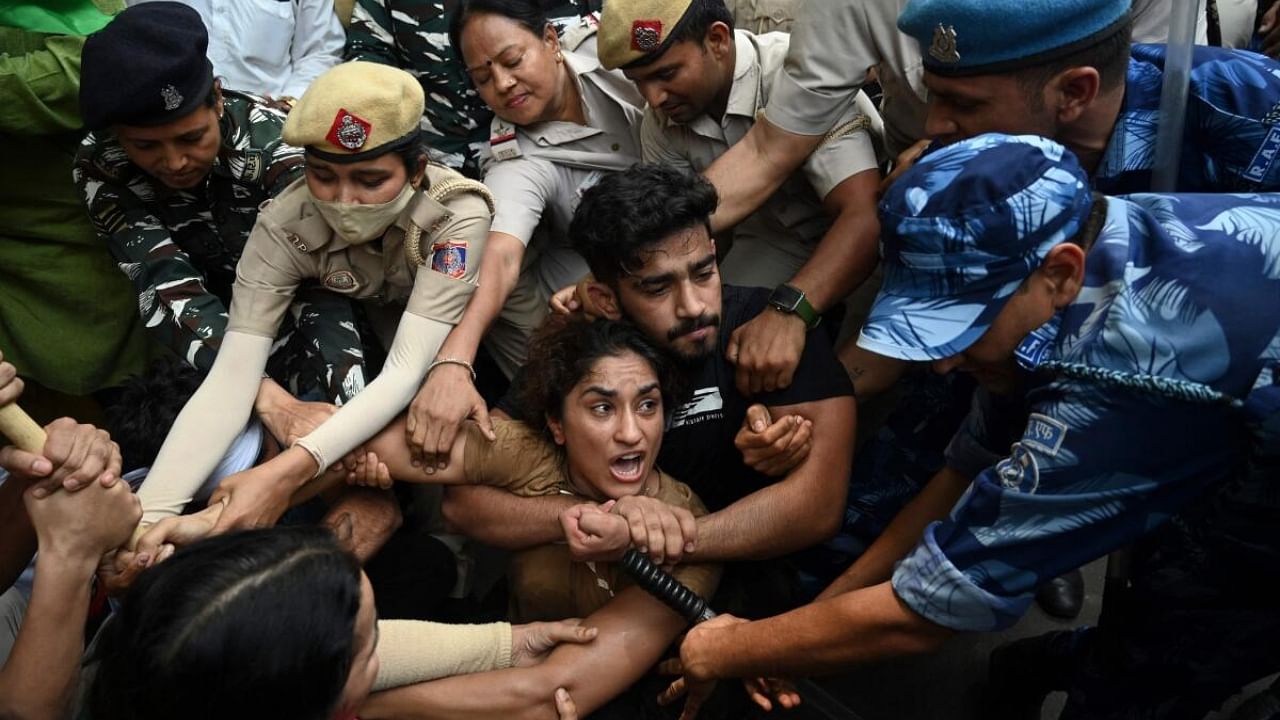
Sometimes, news becomes more than bites of information, or a banal statistic. News grows into a fable — like when politics, instead of being a part of the media, becomes a part of the folklore. The wrestlers’ protest against sexual harassment is one such story, and it has not found the right storyteller.
There is something remarkable about the struggle to which the media has almost been indifferent. As the story unfolds, one sees two models of politics being enacted. The first is the sense of democracy as folklore. Here democracy is not in uniform, and unfolds spontaneously. Sakshi Malik, Bajrang Punia, and Vinesh Phogat and their supporters bring a dignity to protest; a non-violence you do not associate with the stereotype of the wrestler.
In fact, what one sees is an inversion of stereotypes. The stereotype of the wrestler as violent and lumpen gives way to a democratic inventiveness. It is the wrestler who wages a feminist battle with the bureaucracy. The protest literally choreographs democracy as Mallik re-enacts the Satyagrahi. There is no parade of pompous intentions, just a statement of conviction. The irony emerges as the non-violent wrestlers are subject to police violence. An Alice in Wonderland suddenly turns Kafkaesque.
The contrast is stark. The wrestlers understand that justice and fairness are part of the sporting instinct. The sense of it is intuitive, and not politically formal. It is moral but without the paraphernalia of rituals. As Prime Minister Narendra Modi inaugurates the new Parliament building, this panchayat of wrestlers enacts a direct democracy. The wrestlers upstaged Modi’s show, demonstrating that sponsorship of sports and patronage displays little of the sporting instinct. It is the wrestler who exposes the Modi-esque façade of democracy. Our official political frame has no patience for dissenting protest. The violence against non-violent protesters sums it up.
The plot is accelerating, and people are catching on to the message. The famers’ strike has now joined the wrestlers’ protest demonstrating that this regime doesn’t understand folk culture nor democracy. The message of the struggle has become more profound. The protest has grown both as a narrative and as a language. A specific demand for rights now enacts a pedagogy of citizenship. All the regime does is show the standard symptoms of contempt, indifference, and violence. In fact, Modi’s attempt to create a grand spectacle of the inauguration of the new Parliament building falls like a pack of cards. In this panchayat of protests, Phogat and Punia challenge Modi symbolically in a way Congress leader Rahul Gandhi has not. The wrestlers’ strength, competence, and patience go beyond any BJP response. The committee of enquiry the regime instituted displays the moral emptiness of the regime. Fortunately, PT Usha and others realised that one cannot go the Mary Kom way. Truth as an appeal goes far beyond mere governance as a tactic. Empty rituals do not add to the authenticity of democracy.
One must admire the patience and diligence of the protesters faced with the wall of contempt and indifference, and then surviving it calmly. They realised that politics needs networking and solidarity as well as a community ready to listen to their demands. A claim to justice becomes the new ballet of solidarity. This was the message that should have been broadcast from the new Parliament building. Democracy by emptying the ruling establishment’s antics has its own way of turning the tables.
Anyone who is realistic will know that the struggle is not over. The establishment can stretch time to weaken the protest. It can convert a search for justice into a law-and-order problem, even banalize it into a traffic issue. This is what the regime did to Shaheen Bagh. The media suddenly realises that it confronts a folk memory; and the wrestlers’ protest has all the makings of a historic cameo role.
The dipping of medals in the Ganges add grace and gravitas to the movement. The inevitable decision to fast unto death follows. The real question is, when is this regime going to acquire a touch of democracy beyond the empty trappings of electoralism. The Bharatiya Janata Party (BJP) now seems more retrograde as a regime than any khap panchayat. The Modi regime faces a challenge it cannot comprehend as long as it is a part of Lutyens’ Delhi. Direct democracy has challenged the emptiness of majoritarianism.
(Shiv Visvanathan is professor, OP Jindal Global University, and a social scientist associated with The Compost Heap, a group researching alternative imaginations.)
Disclaimer: The views expressed above are the author's own. They do not necessarily reflect the views of DH.